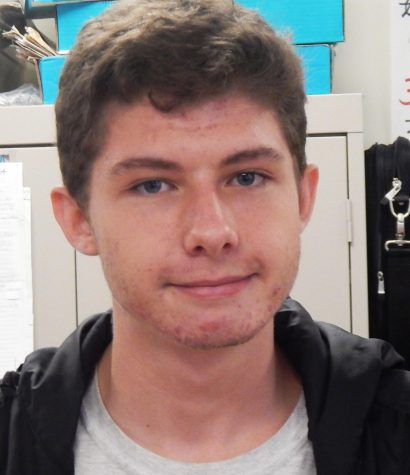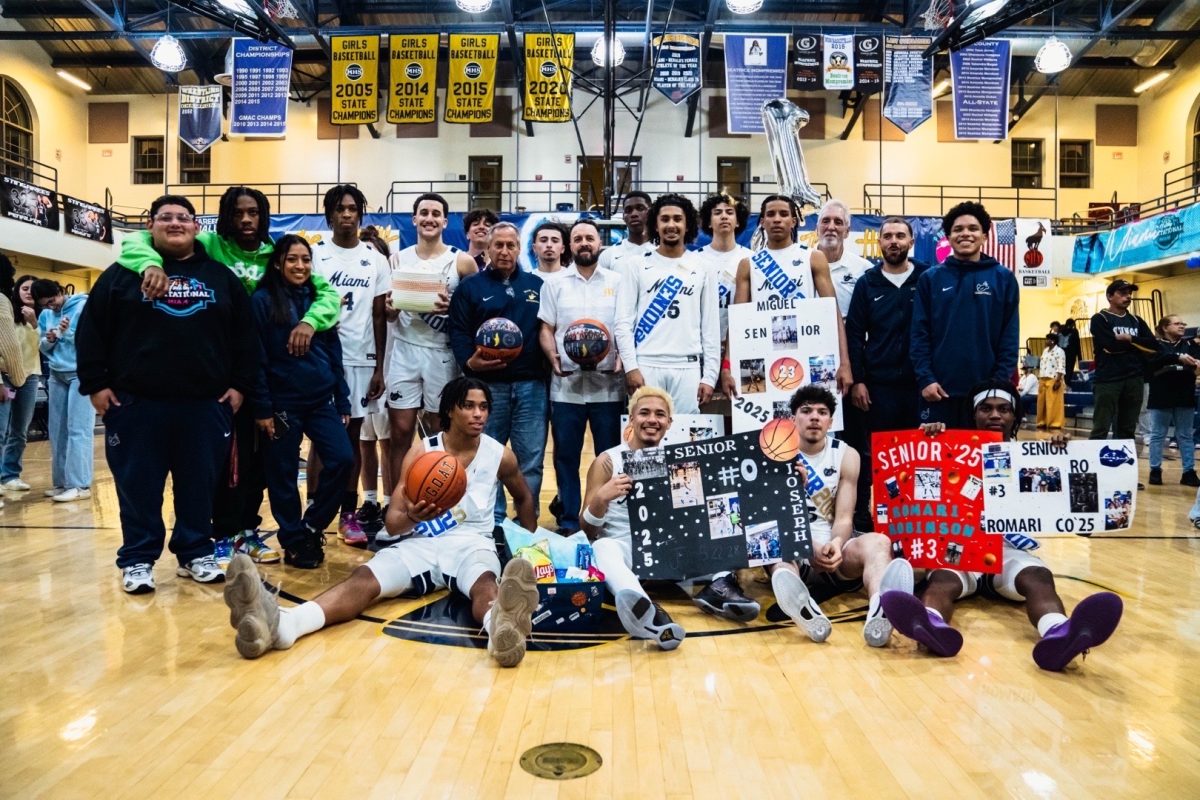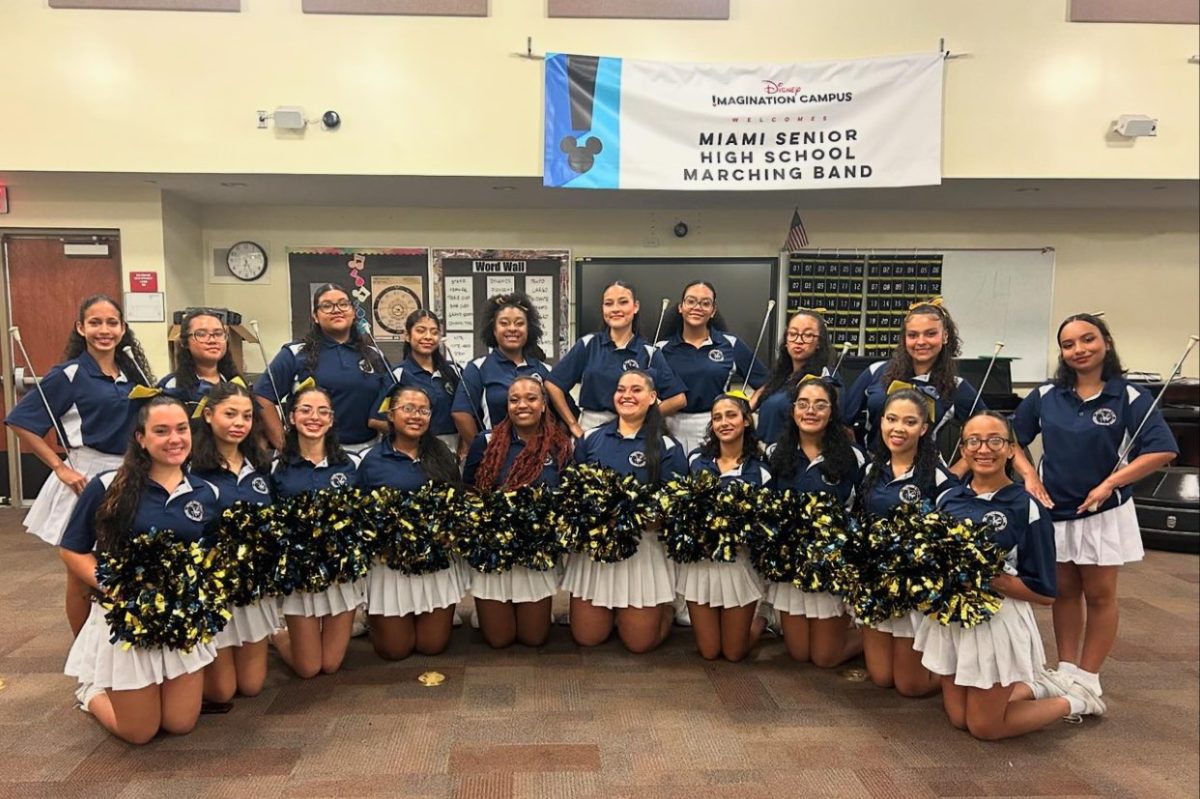Social Studies Behind the Scenes
April 30, 2019
Social studies classes can be very interesting. In world history you can learn about revolutions like the one in France in 1789 or the Industrial one that changed the way things were manufactured. In U.S. history you can learn about World War 2 and the Great Depression.
Miami High’s social studies department is full of other interesting courses, such as economics and constitutional law, and many talented teachers, 80% of whom are Miami High graduates.
Falling in love
Miami High’s social studies teachers came to love their subject by different means. Social studies department chairperson Mr. Rosales was influenced to like his subject through his father, who was a politician in Nicaragua who majored in political science and history and who would watch many documentaries with his son, sparking the young Rosales’s interest and bringing him to where he is now.
World history teacher Ms. Delgado-Kow’s interest in social studies came much later, after she took a required political science class in college. From there, she had an understanding on what other courses she needed to take to major in social studies education. Another contributing factor was an influential professor that taught a class on Joseph Stalin and Adolf Hitler.
Since middle school, U.S. history and constitutional law teacher Mr. Norori has had an interest in how the world works and closely observing current events because what seems like history that occurred a long time ago, was just a few days or years ago to someone else. There was also a very impactful teacher that Mr. Norori, an alumnus of Miami High, had. That was former law-magnet teacher Mr. Jack Hunter, who had a great interest in how the law works and stressed to all his students the importance of being active and well-informed citizens.
Favorite lessons
All these teachers have that one, favorite topic that they thoroughly enjoy teaching every year in every class. In U.S. history Mr. Norori likes WW2 because it is such a defining moment that exhibits bravery and sacrifice. It also allows him to talk about his favorite U.S. president FDR, and all the battles that happened because they turned the tide of the war.
In world history, Ms. Delgado-Kow enjoys teaching about The French Revolution, World War 1, and the first Industrial Revolution.
How important is knowledge of social studies?
Social studies teachers have different perspectives on how important their subjects are. Ms. Delgado-Kow believes that if you really want to know how the world came to be in terms of people, society, and government, you must go back into our history to see what happened to give you a better understanding of the laws or normal behaviors we see among people today.
U.S. History teacher Mr. Rosales believes social studies is extremely important because “We have to learn the past to better understand the present situation and how we can shape the future.”
Does not caring about social studies makes a person ignorant?
Some students do not care about social studies, which might put a person at a disadvantage in the real world. Ms. Delgado-Kow said “not caring about social studies doesn’t make you ignorant as much as it impedes you from making educated decisions, especially when it comes to voting. “You should always have a solid knowledge of your choices and know why you stand with that opinion,” she said.
Mr. Rosales said, “Not knowing about our history makes a person ignorant but not caring and knowing about it does not.”
How can social studies teachers make social studies more appealing to students in general?
Social studies, like many other subjects in school, may not be interesting to all students, so teachers need to find ways to make it appealing. “The best way to get students engaged is to explain things with modern day interpretations. If a student sees and hears something that impacts their everyday life, the more likely it is they care and remember the lesson being taught,” said Mr. Norori.
Mr. Waldo Rodriguez uses the “bad medicine” analogy to explain that social studies is a medicine that some will refuse to take, but like most things in life, you will do things that you don’t like but you need to have your priorities in check.
What’s the hardest part?
Like with any job, there are struggles for our social studies teachers. For Mr. Norori, it’s making the material relevant and interesting for everyone, “because every student has different strengths in certain subjects, and social studies isn’t for everyone.”
“The lack of interest in learning and moving forward in the students is not only the hardest part, but also the most frustrating,” said Ms. Delgado-Kow.
What’s your favorite part about being a social studies teacher?
Every teacher regardless of what he/she teaches has certain elements that make the job worthwhile. “I was made to teach,” said Mr. Waldo Rodriguez. “My first choice in life was to be a Beatle, but since that didn’t work for me, teaching was my next choice.”
For Ms. Delgado-Kow learning the unknown facts in history, the characters, and their lives are her favorite parts of being a social studies teacher.
Mr. Norori said that sharing knowledge with his students, so they can teach what he taught them to others, is his favorite part.
Miami High’s Social Studies Department
| Teacher | Courses Taught |
| Ms. Perez* | World History |
| Mr. Tornillo* | World History |
| Ms. Delgado-Kow* | World History |
| Ms. Yanes* | World History, Government |
| Mr. Bernard | World History |
| Mr. Rosales* | U.S. History, Government, AP Macroeconomics, AP Government |
| Mr. Hampton | U.S. History |
| Mr. Rivera | U.S. History |
| Mr. Norori* | U.S. History, Constitutional Law |
| Ms. Garcia | U.S. History, AP U.S. History |
| Mr. Waldo Rodriguez* | Government and Economics |
| Ms. Gurdian* | Government and Economics |
* = Miami High graduate






